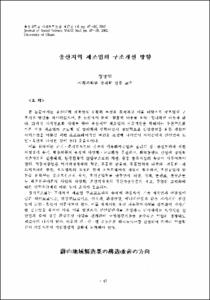중국의 외국인 직접투자 도입정책에 관한 연구
- Alternative Title
- China's Foreign Direct Investment
- Abstract
- 1978년 개혁, 개방 이후 16년간 중국은 22만건 이상의 외국인투자를 승인하였으며, 투자 실행액은 1,000억 달러를 넘어섰다. 중국이 도입한 외국자본은 국내의 자금부족을 해결해주고 첨단기술과 선진 경영방식의 이전을 통해 중국경제의 고도성장에 견인차 역할을 해왔다. 그러나 양적 확대에 치중해온 노동집약적 경공업 중심의 투자유치정책은 무분별한 경쟁을 유발, 경기과열을 조장하고 산업구조의 왜곡을 심화시켰으며, 연해지역 우대정책은 지역발전 격차를 확대시켰다.
이에 따라 중국은 경제정책 기조를 성장위주에서 안정과 효율성 제고방향으로 전환하여 1995년부터 외국인 투자를 선별적으로 수용하는 선별적 외자도입 정책으로 전환하고 있다. 이러한 ?薩뮌? 외국인투자유치정책의 변화는 鄧小平 死後의 정치적 불확실성과 긴축정책, 토지, 임금비용 인상 등 현지 경영여건 악화 등과 결합하여 대중 외국인투자가 감소추세로 나타나고 있다. 그러나 중국의 풍부하고 저렴한 노동력과 고도의 경제성장에 따른 잠재시장으로의 부상으로 외국기업들은 장기적으로는 대중투자를 계속 확대할 계획을 세우고 있다. 그러므로, 기존의 생산효율형 투자와 함께 앞으로는 시장추구형 투자가 급속하게 증대될 것이며, 각국 기업들은 중국의 내수시장 진출을 위한 교두보 구축을 위해 치열한 경쟁을 벌일 것으로 전망된다.
Since the Joint Venture Law was promulgated in 1979, China has made great strides in encouraging and absorbing foreign direct investment. It has also made significant progress in developing its foreign investment policies and laws, and improving the operating environment for foreign enterprises. The results are impressive : by the end of 1994, China ahd approved more than 221,000 foreign investment contracts for a total of over US$ 956.4 billion.
The importance of foreign direct investment in China is evidenct both in its magnitude and the role of foreign-invested firms in generating exports. But FDI policy in China which is focused on the labor-intensive light industries, give rise to excessive competition, fostering business overheating, and expanding gaps of interregional development. Therefore, China's government changes its FDI policy to selective FDI policy from 1995.
Such changes are main causes to decrease in FDI recently, with environmental expectation of after Deng's situation, political uncertainty, and other economic problems. Nevertheless, foreign enterprises plan to expanding its investment in order to access China's huge domestic market in the long-run.
Since the Joint Venture Law was promulgated in 1979, China has made great strides in encouraging and absorbing foreign direct investment. It has also made significant progress in developing its foreign investment policies and laws, and improving the operating environment for foreign enterprises. The results are impressive : by the end of 1994, China ahd approved more than 221,000 foreign investment contracts for a total of over US$ 956.4 billion.
The importance of foreign direct investment in China is evidenct both in its magnitude and the role of foreign-invested firms in generating exports. But FDI policy in China which is focused on the labor-intensive light industries, give rise to excessive competition, fostering business overheating, and expanding gaps of interregional development. Therefore, China's government changes its FDI policy to selective FDI policy from 1995.
Such changes are main causes to decrease in FDI recently, with environmental expectation of after Deng's situation, political uncertainty, and other economic problems. Nevertheless, foreign enterprises plan to expanding its investment in order to access China's huge domestic market in the long-run.
- Issued Date
- 1996
- Type
- Research Laboratory
- Alternative Author(s)
- Choi,Byong-Cheol
- Publisher
- 사회과학논집
- Language
- kor
- Rights
- 울산대학교 저작물은 저작권에 의해 보호받습니다.
- Citation Volume
- 5
- Citation Number
- 3
- Citation Start Page
- 113
- Citation End Page
- 134
- Appears in Collections:
- Research Laboratory > Journal of social science
- 파일 목록
-
-
Download
 000002024539.pdf
기타 데이터 / 2.03 MB / Adobe PDF
000002024539.pdf
기타 데이터 / 2.03 MB / Adobe PDF
-
Items in Repository are protected by copyright, with all rights reserved, unless otherwise indicated.